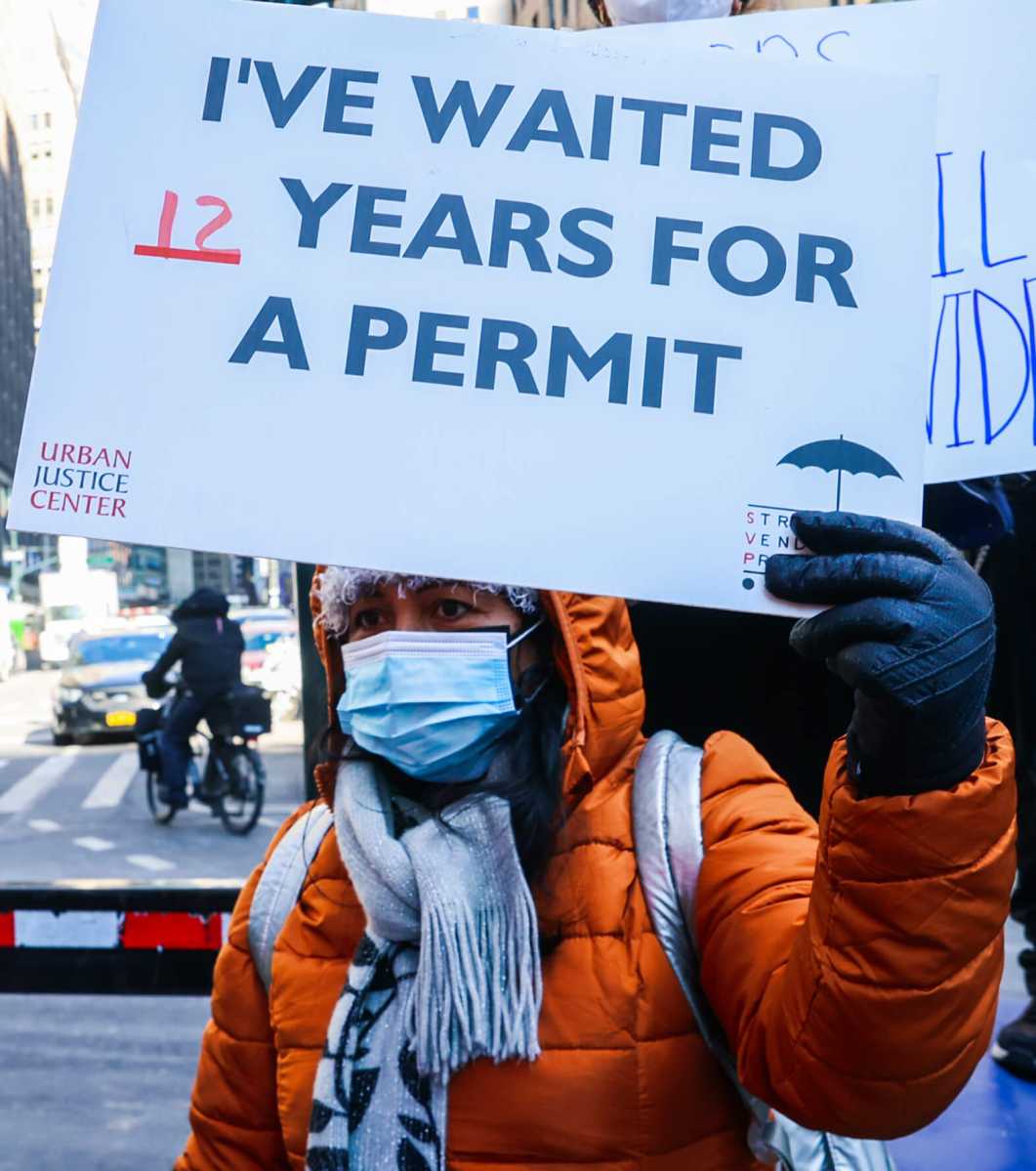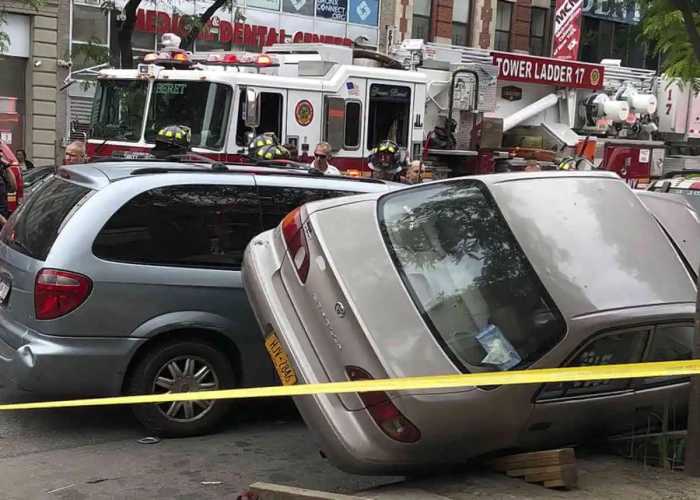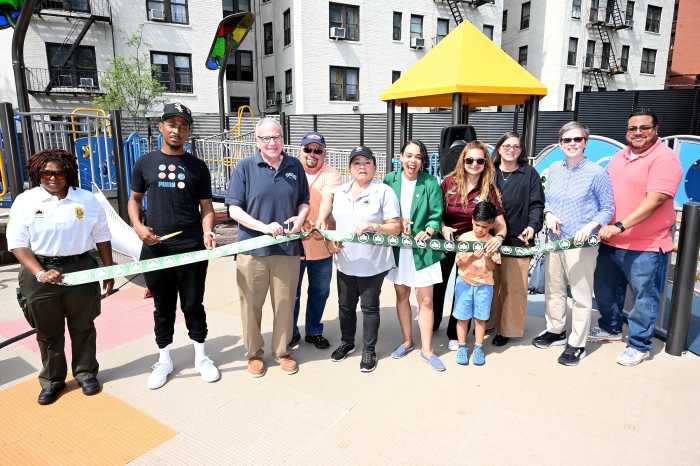More than 150 New York state street vendors and advocates marched through a brisk morning in Times Square on Thursday demanding the passage of legislation that would legitimize an industry that’s been the bedrock of New York City’s concrete open market for decades.
Thursday’s rally took place on the one-year anniversary of the city’s passing of Intro 1116, which introduces 4,000 new mobile food vendor permits over the course of the next 10 years, with the first set of licenses to be issued in 2022.
Street vendors and advocates point to Senate Bill S1175A as the next step to legitimizing a workforce of roughly 20,000 vendors in the state, and if passed, would create a pathway to entrepreneurship by removing barriers to licensed street vending and also vacate past criminal convictions for street vending offenses.
“Without the state recognizing our passions, our livelihood and our place in this city, it’s impossible to try and make a living without looking over your shoulder,” said Pascual Domingo, who can be seen on Fordham Road selling rice and beans. “I was arrested for selling hot beans on a cold, wintry day (in 2019), and I remember the police officers dumping all my hard work like it was trash.”
By 2032 there will be 9,000 supervisory licenses — which require a permit holder to be physically present at the vending station at all times — available for mobile food vendors across the state. But Bronx-based street vendors told the Bronx Times that they have been in a professional purgatory, spending years on the city’s waitlist for licensure, that some have been closed for more than a decade.
Domingo said he’s been on the city’s waitlist since 2015 and has not received any status updates on his application. Another vendor Marta Delriego, who sells hand-knit accessories in The Hub, said she was denied by the city twice for licensure, without proper explanation.
“Even when you try and do it their way, they don’t want to budge and give out more licenses to people who are just trying to make a living like everyone else,” said Domingo, a Dominican immigrant who recently gained American citizenship in 2020.
Data compiled by the Bronx Times show that among the 11,923 open applications on a waiting list for licensure by the city’s Department of Consumer Worker Protections (DCWP), 2,837 Bronx-sited vendors are still awaiting approval or denial for official general vendor licensure by the city — the second-highest waiting list total behind Brooklyn’s 2,928 vendors.
Additionally, the Bronx has the highest level of application denials over the past year, 72 of them, with 20 applications voided by DCWP. But DCWP officials told the Bronx Times that when it comes to addressing unlicensed vendors in the city — a responsibility the city agency formerly known as the Department of Consumer Affairs assumed from the NYPD in January — balancing its educational efforts along with calls for more enforcement among those issuing grievances to the city is “complicated.”
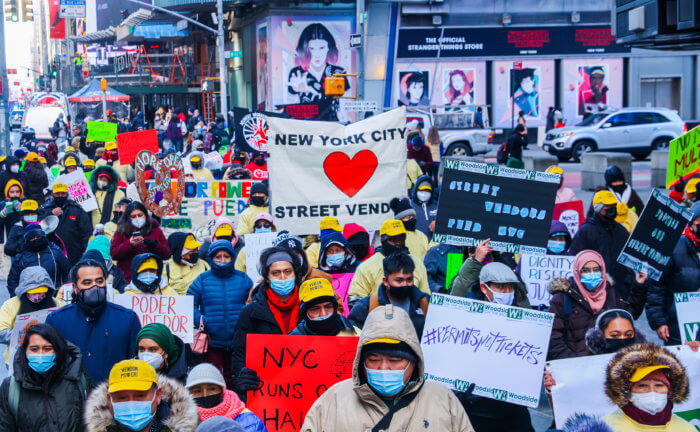
“Vending is a complicated issue that touches us all — from the vendors themselves to local businesses to residents and visitors,” a spokesperson from DCWP said. “Our goal is to hear concerns from everyone involved and strike a balanced approach that is equitable for all, which includes ongoing education coupled with scaled, strategic enforcement, especially in problematic areas.”
Since Jan. 15, 2021, DCWP has received 6,606 complaints about vending — 441 of the complaints were about the Bronx — coming from general public, community boards, Business Improvement Districts (BIDs), advocates and elected officials, the agency said. Since June 1, DCWP has conducted 6,929 vending inspections in response to complaints and issued 521 violations, with 829 inspections and 81 violations being issued in the Bronx.
But DCWP has also conducted nearly 30 educational walks in popular vending corridors, such as Fordham Road, during which multilingual staff disseminated inspection checklists (translated in the city’s designated languages) to hundreds of vendors to promote compliance. Yet, unlicensed vendors say that they are still bearing the brunt of onerous fines and targeted enforcement by both DCWP and NYPD, with fines for general vending ranging from $250 per day up to $1,000 per day for continued unlicensed activity.
According to the police department’s quarterly report, the NYPD issued 108 civil summons and 14 criminal summons related to street vending in that same span. DCWP does not have the authority to compel vendors to provide ID, and the department was not given authority to confiscate items from general vendors, unlike the NYPD.
Without passage of Senate Bill 1175 or a fundamental change to the city’s licensure process, advocates say vendors are forced to either rent a permit from existing permit-holders on an underground market for up to $25,000, or vend without a permit.
‘Vendors United!’: NYC street vendors call on city to legalize and decriminalize street vending
“I have been a street vendor for 16 years. In these 16 years, I have been arrested and given tickets for selling incense,” said Sofiani Hassimi, a Harlem street vendor originally from Niger and member of the Street Vendor Project. “Not having a license causes me a lot of mental stress, the government does not allow me to work with dignity. I want to make money to take care of my family, like every vendor. I have three daughters that I love and I am proud to work for them every day.”
Street vendors, hailed as essential workers during the pandemic and include a workforce buoyed by immigrants, women of color and veterans, are New York state’s smallest businesses. Vendors generate annually an estimated $71.2 million in local, state and federal taxes, $293 million to the city’s economy, $192 million in wages, and create 17,960 jobs in New York City, according to the Institute for Justice.
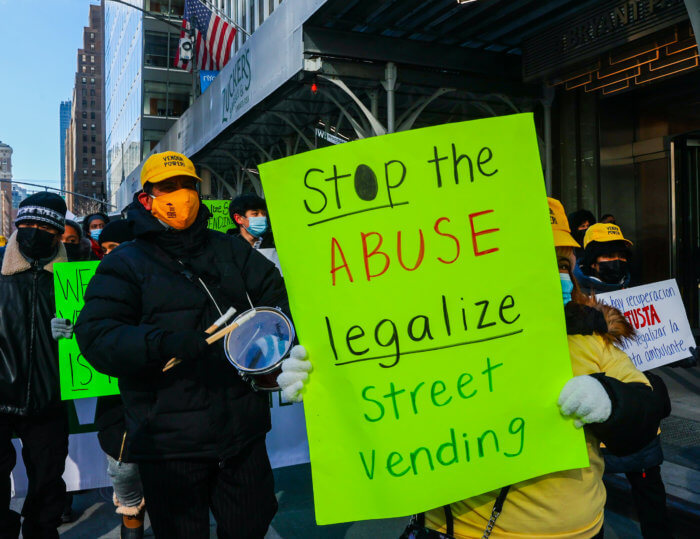
But with just 853 total licenses granted for non-veteran merchandise vendors, the limited number of licenses in New York City might exclude street vendors from being included in the $1 billion relief for small businesses outlined in Democratic Gov. Kathy Hochul’s executive budget, advocates say.
“The timing is right to lift the cap on entrepreneurship and regulate street vending,” said state Sen. Jessica Ramos, a Queens Democrat who represents a heavy-vendor district in Jackson Heights. “Both Mayor Adams and Governor Hochul recognize how critical small businesses are to a just recovery, but any effort that does not include street vendors in relief is a half measure.”
While vendors may still feel left out in the cold until legislation is passed to legitimize their business and passion, they do have allies on the City Council. One such ally, City Councilwoman Pierina Sanchez, who represents Fordham, said vending was a way for her family to get by upon immigrating to the U.S. She’s fighting hard to allow a workforce of vendors the opportunity to get by, as well.
“When my family immigrated to the United States in the 1970s, some of them worked hard, as street vendors, to get by. It should not be a crime to work to put food on the table or to work to keep a roof over your family’s head. I see my family in you,” said Sanchez, a Progressive. “You deserve support for the hard work that you do, many of you as immigrants, and all of you as part of the fabric of our community. I am an ally in this, and I will work to make sure that you get the necessary support.”
Reach Robbie Sequeira at rsequeira@schnepsmedia.com or (718) 260-4599. For more coverage, follow us on Twitter, Facebook and Instagram @bronxtimes.

